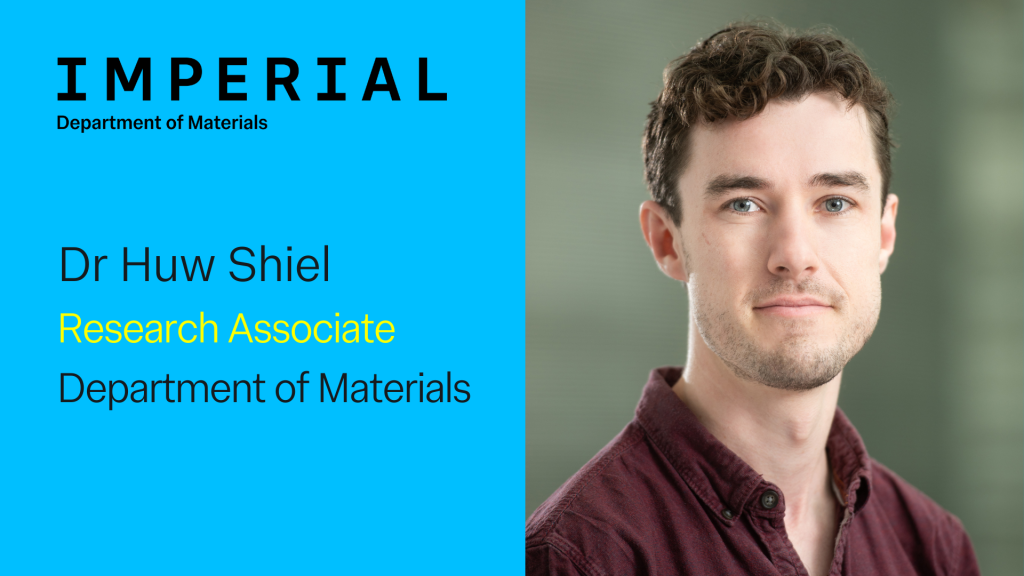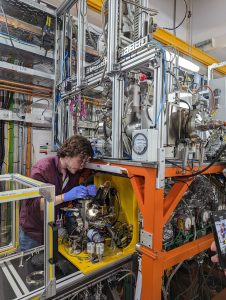
Dr Huw Shiel is a postdoctoral research associate in the Department of Materials. His research investigates improving the performance or lifetime of batteries and other energy storage solutions. In this blog post, he shares more about his research, the potential impact of this work, and what he enjoys outside of research.
What inspired you to become a Materials Scientist?
During my undergraduate in physics, I tried out a few different research topics, but in my final year, I realised that I wanted to work on something that would be useful in the fight against climate change. My Master’s project, researching solar energy materials, was so engaging because I had a tangible output from my work and it felt like we were making something real that could make a real difference. I also found that splitting my time between the lab and the computer was the right kind of balance for me to get the most out of my work.
How would you explain your research to someone outside the field?
The idea of my project is to perform experiments on materials while they are changing inside a system, which we call operando experiments. For example, one of my main projects is to perform operando x-ray absorption spectroscopy on battery materials to study changes in chemistry and degradation mechanisms without destroying the delicate system by taking the battery apart. My wider project, the InFUSE Partnership, is carrying out similar research on many different energy transition technologies such as carbon capture, cooling in electric vehicles, and hydrogen storage, so I get to be involved with lots of different things.
Why did you study this area and why is it important?
 Batteries and other energy storage solutions are critically important right now because, while solar and wind power are becoming very economically viable, they only provide intermittent power, and batteries are needed to level out this supply. The current lithium battery technologies use very unsustainable materials and the best alternatives just don’t have the same performance or lifetime. If we can understand how they degrade, then we can find ways to improve them.
Batteries and other energy storage solutions are critically important right now because, while solar and wind power are becoming very economically viable, they only provide intermittent power, and batteries are needed to level out this supply. The current lithium battery technologies use very unsustainable materials and the best alternatives just don’t have the same performance or lifetime. If we can understand how they degrade, then we can find ways to improve them.
How could this research make an impact?
By developing new, cutting-edge characterisation techniques, we are providing tools for the study of many different systems and technologies. The InFUSE Partnership that I am part of is collaborating to develop these tools for a range of energy transition technologies, from batteries to geological carbon capture to EV coolants and lubricants. The hope is that with these tools, we can accelerate the development of these technologies. Understanding interface evolution is the key to engineering those interfaces to work better, last longer, or change in a certain way.
Who do you collaborate with at Imperial and beyond?
At Imperial, I collaborate across many departments, particularly the carbon capture group in Chemical Engineering, the Fuels and Lubricants group in Mechanical Engineering, the CO2 storage groups in Earth Sciences, and the Ceramics and Corrosion groups in Materials. Outside of Imperial, we are in a partnership with Diamond Light Source, a particle accelerator in Oxford, and Shell, the energy company. By working with Diamond, we get a lot of expert knowledge on using high-energy x-rays for our science, and by working with Shell, we can target our efforts at real-world problems facing the energy sector’s transition to sustainable energy.
What do you enjoy most about what you do?
I love that I get to be involved with so many different projects and that I have the freedom to lend a hand to any project that comes my way. Working at Imperial, as part of such a big collaboration, also allows me to see and participate in the most advanced research in these areas, which is very exciting.
What do you enjoy outside of research?
Outside of research, I love to play or watch pretty much any kind of sport, particularly climbing and football. Also, being from the countryside of North Wales, I like to get out of the city on my bike whenever the weather allows!
What’s something your colleagues would be surprised to learn about you?
Many people don’t realise that I learned most of my formative maths and science through the medium of Welsh. So, when I went to university, I had to learn a lot of scientific language and nomenclature all over again. Even now, I still sometimes come across some obscure terms that I only know in Welsh!